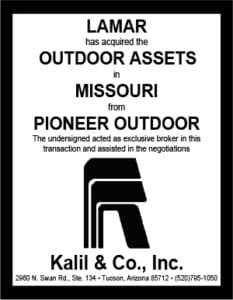A Billboard Insider reader writes with the following question:
“Would it be possible to find any case where a billboard real estate tax was based on earnings, but was overturned by a federal or state government?”
The short answer is “no,” I’m not aware of any federal or state cases directly on this point, namely a challenge reaching the appellate courts where a taxing jurisdiction imposed ad valorem or property taxes on billboards as real estate interests. Now, by contrast, there’s been considerable litigation on excise taxes and permit fees assessed against billboards. For example, Cincinnati and Baltimore recently enacted and levied fees on billboards, which were challenged by Lamar and Clear Channel. And, different results were obtained in the ensuing litigation, with the billboard fees held a First Amendment violation in Lamar vs Cincinnati in Ohio, while they were accepted as constitutional in Maryland in Clear Channel vs Baltimore.
I can also opine that assessing billboard advertising revenue for taxation of the billboard as a real property interest would likely be illegal, at least in Texas. Section 11.02 of the Texas Property Code provides that “intangible personal property is not taxable.” Section 11.04(6) goes on to define “intangible personal property” as “a claim, interest, right, or other thing than has value but cannot be seen, felt, weighed, measured, or otherwise perceived by the senses…” A “permit” is expressly listed as an example of the type of “property” not subject to taxation under the Property Code. Further, the Texas Administrative Code, Title 43 Rule 21.202, expressly provides billboard permits are not property rights: “Issuance of a permit or license under this subchapter does not create a contract or property right in the permit or license holder.” I suspect most of the States follow this type of Texas law.
Indeed, a situation arose about 20 years ago, where the Harris County Appraisal District designed a mass appraisal method on billboards, in an attempt to assess billboards as real property interests, and to value them based on the advertising revenue they generated. As I recall, this grand plan went nowhere, after I summarized these straightforward legal authorities to the HCAD lawyers. I had to file a lawsuit on behalf of my billboard owner clients, but the HCAD scheme was scraped and the litigation settled before reaching the appellate courts.
Despite strong law to the contrary, I doubt we’ve seen the last of the attempts to stick it to the billboard industry through higher and more taxes and fees. We’re in the midst of the Legislative Session in Texas, and I recently saw a claim by Scenic Texas that billboard owners are getting an unfair sweetheart deal by securing condemnation awards for the removal of billboards to accommodate highway improvements, without assessing and taxing the billboards at the same levels of value. Of course, what Scenic Texas failed to disclose to the Legislature is that after the Texas Supreme Court’s 2015 decision in Clear Channel vs State of Texas the only compensation paid for condemned billboards is their cost less depreciation, unlike the lost rents afforded to the owners of apartments, office buildings, and other income producing properties. Yes, billboard owners are not treated equally, but not in the way Scenic Texas and other opponent of the industry would portray it.
To receive a free morning newsletter with each day’s Billboard insider articles email info@billboardinsider.com with the word “Subscribe” in the title. Our newsletter is free and we don’t sell our subscriber list.
Paid Advertisement


















California property taxes must be based on real property. They may not be based on intangibles, such as the value of a permit or providing design services, etc. Since billboards require a permit to operate, a tax assessor would have to deduct the permit’s contribution (and the contribution of any other intangibles) from the revenue stream. The State Board of Equalization has said the using a revenue stream to value a billboard for property tax purposes is “disfavored.”
In formal guidance issued in 2002, the Board of Equalization said, “The Board decided that (1) the use of operating income is disfavored because of the difficulty in isolating the income attributable to the taxable property, and (2) since a billboard use permit is necessary to put the land to beneficial and productive use as a billboard site, the land must be assessed and valued by assuming the presence of the use permit.”
Probably due to that guidance, we have not found a case in California directly addressing valuation of billboards for property tax purposes. We have found cases that apply the same reasoning to hotels and a power plant. That is, if the tax assessor wants to use revenue stream to value property, it must deduct from the revenue stream the contribution of permits and other intangibles.
P.S. In the first paragraph, last sentence, “… the using a revenue stream …” should be “…that using a revenue stream …”